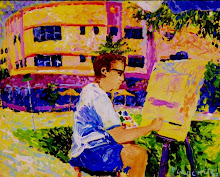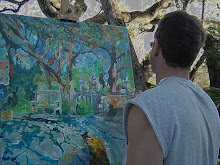Tuesday, December 30, 2008
Sunday, October 5, 2008
Saturday, October 4, 2008
New York, New York... It's a Wonderful Place
Sunday, September 14, 2008
Capturing History, Before It's Gone

Return to Wainwright (Park) P. Crockett 1996
Some of my greatest adventures happen when I venture outside into the world armed with my easel, palette, and paintbrush.
Several years back I came across this wonderful wreck of an old Coconut Grove home on a corner of increasingly busy Tigertail Avenue, and felt immediately drawn to paint there. I loved it all the more because it so obviously didn't belong among the new "nouveaux" McMansions popping up like some regrettable fungus, everywhere. Its state of "wild grace" spoke volumes about what the Grove had once been, and was now being lost, a little bit and everyday, forever. The year was 1993.
I thought the place deserted, but it was not.
The painting is called "Welcome to the Peacock Inn," and here's why. In the middle of my second session, an old man as disheveled and inspired as the ground he walked upon suddenly appeared out of nowhere, only a few feet away, a large square bandage covering his nose and big 'ol shotgun at the ready. He stood his ground, glaring at me menacingly. "This is a first," I thought, my heart pounding like a drum. I raised the paintbrush in my hand and said something like "Don't shoot, I'm only an artist."
He immediately responded, "Don't be alarmed. I just carry the weapon for self-protection," and proceeded to approach and graciously introduced himself. "Sorry about that," he offered, "I didn't mean to make you nervous." "No, it's all right. I understand," I told him, knowing the neighborhood, and also feeling grateful that I would apparently have more time to live!
And so we fell in to conversation. Despite the awkward introduction, he turned out to be a dear old man with a big heart, heavy laden with memories. As my Grandfather used to say, "his best days were behind him." And he knew it. He asked if I'd like an iced tea and the day was indeed still and hot, and I said I would very much, thank you, and we talked for a while before he courteously excused himself so that I might once again proceed with my painting, in earnest.
I have always loved old people, and the way they have time for you, and the way they can sometimes feel on fire to pass along incandescent memories of a once-golden horizon now grown small, and cold. This man, now my host, relished an opportunity to speak with a much more recent Miami native about the "old Grove," and to explain how different things used to be. As it turns out, he and his wife of many, many years lived in a small house toward the back of the jungled property, with far too many cats. His wife was "a Peacock," he explained, meaning a member of one of the earliest and most prominent pioneer families to have undertaken the task of "settling" the wild, heavily forested slice of land along Biscayne Bay they came to call Cocoanut Grove.
Stranahan Hammock P. Crockett 2004
Before the City of Miami even existed, pioneer Charles Peacock, recently arrived from England along with his wife Isabella and their three sons, settled in Coconut Grove and in 1882 opened the Bay View House, later called the Peacock Inn, the first hotel in the area. Set in an absolutely pristine hardwood hammock (or forest) alongside the crystal clear and fish-filled waters of Biscayne Bay, the comforts of the Inn attracted a wide variety of visitors from all over the world, including scientists, authors, and nobility. The place was something of a human "rainbow," with black workers that had relocated from the Islands and come to help build the place and then work there (in the process establishing a once-fine neighborhood in the area), Seminole Indians casually dropping by to trade, and a mosaic of others.
More than a few who came to visit wound up making the Grove their home, including yacht designer and wrecker Ralph Munroe whose home, The Barnacle, is now a state historic site; homesteader Flora McFarlane, Coconut Grove's first schoolteacher and founder of the Housekeeper's Club (now The Woman's Club of Coconut Grove); and author Kirk Munroe.
Also, with that area as popular with boaters as it was, young men came to build the boats. And they knew craftsmanship as it had been taught to them, a way of life with an aspiration toward excellence running right through the heart of it. No cutting corners, period. So one can imagine the Inn was built well. And yet: to me, it seems a given that the place was held together not so much by nails and mortar, as by love. Or, put another way, hospitality.
(Just imagine it: having been out on the wild bay fishing, or off in the tangled forest, you have made your way back to the Inn and the light is fading near day's end. You are tired, hungry, and alive. The Earth is as young and as clean as it will be ever again, though you cannot know this.

But the wildness of the place is very real: of course there are the mosquitos and the no-see-ums, and the rattler and water moccasin, and then the bears and the roaming panther, and God only knows what else. So the warm golden light you see pouring from the windows of the old Inn means something, and if you've approached from inland it must be awfully nice to once again lay eyes upon the great deep blue expanse of bay, and to stop for just a moment and feel the cool salt breeze on your face, even in the dead of summer.

And at the same time the gentle hum of conversation and laughter floating out from within promises another evening of easy communion, a sharing of good hearty food and drink (if you're lucky), before laying down to dream.)
So "progress" had inevitably come calling, and there this family had stood, caught in a singular moment on one of the inumerable and relentless grinding cusps of history, the "fault lines" between past and present, and thus future, that in some ways define this area. They watched an epic and yet everyday event: a curtain that others could not even see was falling down forever all around them, erasing all they had known and once held precious.
What "progress" fails to ever mention or make clear is its cost: that forevermore we will wonder where exactly we have come from, and grandchildren, unless they are very lucky indeed, might never be able to even begin to comprehend what daily life might have been like for their grandparents when they were young here. Is that not of utmost importance, somehow? This I feel, more than understand.
So the family had moved the fragments of what had been to the site, an early and inspired recycling piecing together a home in which they might carry on. But even that had been many years past. Now it was all gracefully (but completely) falling apart, being inexorably reclaimed by nature despite its stubborn endurance. I believe that pained him. "It looks like it must have been an excellent house," I said. "Oh, it was," he agreed. He fixed his eyes upon the broken glass of an upstairs window, as if a child he loved were still there waiting for him to come home from work, face pressed against the glass. For a moment it was easy to imagine the sound of a ringing dinner bell, to catch just the muted outlines of the soundtrack of a family living out one of its days, to smell the smoke wafting on up through the coral rock chimney.
"Wish you couldv'e seen it, in the day." "Wow," I said, "me too."
One hears all kinds of stories about Miami, some of which are actually true. As it turns out, this one was. And not only was this fading glory in Coconut Grove part of the Inn, it was part of its very heart center. Here is a photo of the Inn recording a celebration of Christmas, 1886, with "all residents of Bay Biscayne present":
I wound up completing three paintings on the site, and am still occasionally recognized at some garage sales, etc. as "that guy who was out sitting by the side of the road painting that old house," for Tigertail Avenue is heavily traveled. Yet even the wonderful wreck I painted is now several years gone and but another memory, a generic McMansion (with even a tiny kidney-shaped pool squeezed in) having taken its place, crowded on to what once had been the front half of a luxurious expanse of land. Gone.
And in the passing years I'm sure my kind host and his wife have also both ascended to their heavenly reward, for in many sad ways they no longer belonged here. Hopefully they frolick once again, young and laughing and overfilled with the sheer promise of it all, in virgin forest fronting the most beautiful blue and crystal-clear bay you can imagine, forever.
God bless and keep them both. May they rest in peace.
Tuesday, August 19, 2008
Coconut Palm II
 Coconut Palm II P. Crockett 1993
Coconut Palm II P. Crockett 1993Who doesn't love the most improbable coconut palm, with its luxuriant shade and its prolific output of delicious fruit? As a painter I love that, by their very design, they seem always in motion. There is also a sound like music, made only and in all the world by wind playing the fronds, like a harp.
Monday, August 18, 2008
Subscribe to:
Comments (Atom)



























